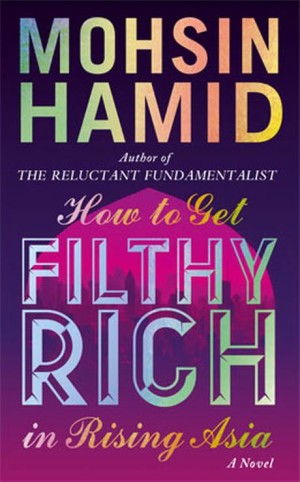Once in a while you come across a refreshingly unusual book, a book so utterly different that it inspires you to see novels in a new light. With its gaudy dust jacket and brazen title, How to Get Filthy Rich in Rising Asia is such a book, and it is an excellent one at that. I was a big fan of Moshin Hamid’s The Reluctant Fundamentalist and this book is, in my opinion, equally good.
How to Get Filthy Rich in Rising Asia is written in the second person, in the style of a self-help book. With a generous serving of satire, Hamid ridicules the genre in general, and even more so in the context of this subject matter.
The second person angle has a slightly disorientating effect at first, but you get used to it and there is, of course, a purpose behind this curious choice of writing style. The striking contrast between the destitute situation of the protagonists and the patronising tone of a self-help book is comic and tragic in equal measure. The idea that you can help yourself out of poverty of this magnitude with the aid of a book is, obviously, absurd.
It is a clever stylistic choice, which depersonalises the heart-breaking stories with chilling effect. Isn’t this the way we observe the poverty and destitution of Asia, with a birds-eye view, far removed and out of earshot?
Viewing the scene from the lenses of an orbiting reconnaissance satellite, an observer would see two children behaving peculiarly. He or she would note that they display undue caution in approaching the sewer, as if it were not a trickle of excrement of varying viscosities but rather a gushing torrent.
All the characters in this extraordinary novel are nameless, the city and country they live in likewise. Hamid is writing about a whole generation of Asian children, living in horrendous poverty, subjected to forced marriages, child labour and abuse, all described in clinical terms, at an arms length distance.
The protagonist, a young man, bright and ambitious, but dirt poor, is determined to work his way out of the slums. He falls in love with a girl from the same slum who has got ambitions of her own. What these children lack in physical strength from years of malnutrition and disease is more than made up for by their survival instincts and determination.
‘That looks heavy. Can I help?’
‘No. Anyway you’re like me. Skinny’
‘I’m strong.’
‘I didn’t say we weren’t strong.’
Taken advantage of at every turn, our heroine climbs up the modelling career ladder, to become a heartbreakingly cynical, minor celebrity.
‘You wanted to leave the neighbourhood and now you have done it. You’re famous.’
‘And you?’
‘I want to be rich.’
She laughs again. ‘It’s that simple?’
‘Yes.’
‘Well. Tell me when you are.’
‘I will. But I don’t have your number anymore.’
Our hero establishes a counterfeit bottled-water operation and slowly starts amassing a fortune. But business in ‘Raising Asia’ is fraught with obstacles from bloodthirsty competitors to greedy government officials. And the pursuit of wealth can be a lonely business…
Hamid, a Pakistani who grew up between Lahore and America, challenges our view of Asia, especially the booming economical miracle of Asia. It is the human cost of this miracle that is at heart of the novel and the author conveys this message with buckets of satire but without a drop of sentimentalism. As in The Reluctant Fundamentalist, there is a political dimension to Hamid’s writing, a desire to make people in the West see the other side and, without being preachy or moralising, he succeeds. How to Get Filthy Rich in Raising Asia, is elegantly written with seamless shifts of perspectives. The story sucks you in from the very first page and culminates with an ending that will leave a lump in your throat…





